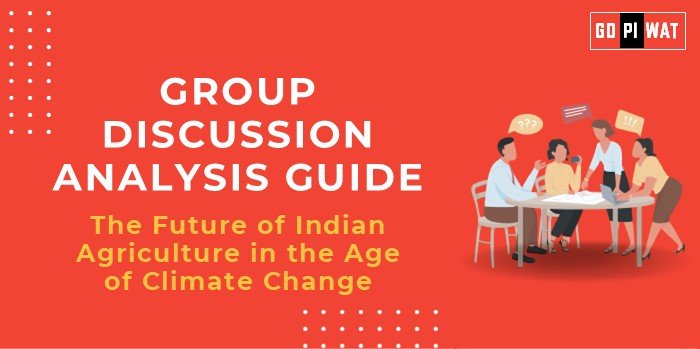📋 Group Discussion (GD) Analysis Guide: The Future of Indian Agriculture in the Age of Climate Change
🌐 Introduction to the Topic
Opening Context: Agriculture is the cornerstone of India’s economy, employing nearly 50% of the workforce. However, climate change—manifested through erratic rainfall, rising temperatures, and extreme weather events—poses significant threats to its sustainability.
Topic Background: India ranks among the top global producers of staple crops like rice and wheat. The increasing challenges of declining water tables and greenhouse gas emissions necessitate a shift towards climate-resilient agricultural practices.
📊 Quick Facts and Key Statistics
- Agricultural Contribution: Approximately 18% to India’s GDP (2023), underscoring its economic significance.
- Farmer Dependency: Over 70% of rural households rely primarily on agriculture for their livelihood.
- Climate Impact: Projections indicate up to a 30% reduction in crop yields by 2050 without effective mitigation efforts.
- Irrigation Dependency: About 51% of Indian farmlands are rain-fed, highlighting their vulnerability to climate variability.
👥 Stakeholders and Their Roles
- Government Agencies: Develop policies and provide subsidies to promote climate-resilient practices.
- Farmers: Implement sustainable practices and adopt new technologies to enhance resilience.
- Private Sector: Innovate agri-tech solutions and fund research and development in climate-resilient agriculture.
- NGOs and International Bodies: Raise awareness and advocate for global climate funds to support adaptation strategies.
🏆 Achievements and Challenges
✅ Achievements:
- Adoption of Micro-Irrigation: Under the Pradhan Mantri Krishi Sinchayee Yojana (PMKSY), approximately 13 million hectares have been brought under micro-irrigation, improving water use efficiency.
- Crop Insurance: The Pradhan Mantri Fasal Bima Yojana (PMFBY) has provided coverage to over 57.2 million farmers as of 2023, offering financial protection against crop losses.
- Promotion of Organic Farming: Initiatives have led to the certification of 4.7 million hectares of organic farmland, promoting sustainable agricultural practices.
⚠️ Challenges:
- Yield Gaps: Indian crop yields are often lower than global averages, indicating potential for improvement.
- Limited Adoption of Climate-Resilient Crops: Awareness and cultivation of such crops remain low.
- Fragmented Landholdings: Small and scattered farm plots limit the scalability of advanced agricultural practices.
- Water Scarcity: Depleting groundwater levels exacerbate irrigation challenges.
- Policy Gaps: Insufficient enforcement of sustainable farming policies and inadequate financial incentives for smallholder farmers hinder progress.
🌍 Global Comparisons:
- Success: Israel’s advanced drip irrigation systems and water-efficient farming models showcase effective adaptation strategies.
- Challenges: Sub-Saharan Africa faces similar struggles with small-scale farming and dependency on rain-fed agriculture.
📝 Case Study:
Maharashtra’s Jalyukt Shivar Abhiyan: This watershed development program has significantly improved water availability in drought-prone regions, supporting farmers’ resilience to climatic stresses.
📑 Structured Arguments for Discussion
- Supporting Stance: “India’s efforts in adopting climate-resilient agriculture, such as promoting organic farming and micro-irrigation, are essential steps in securing its agrarian future.”
- Opposing Stance: “The high cost and limited reach of sustainable practices make widespread adoption challenging, particularly for marginal farmers.”
- Balanced Perspective: “While India’s policies show promise, addressing implementation barriers and ensuring equitable access to resources is key to achieving long-term success.”
💡 Effective Discussion Approaches
- Opening Approaches:
- Begin with a statistic illustrating agriculture’s vulnerability to climate change (e.g., “India loses 10-30% of its crop yield annually due to climatic factors”).
- Highlight a success story like Maharashtra’s Jalyukt Shivar program to show the potential of regional interventions.
- Counter-Argument Handling:
- If someone argues that cost is a major hurdle, counter with the scalability of cost-effective techniques like zero-till farming or natural pest control.
🔍 Strategic Analysis of Strengths and Weaknesses
💪 Strengths:
- Vast arable land and diverse agro-climatic zones.
- A growing ecosystem of agri-tech startups and public-private partnerships.
❌ Weaknesses:
- Dependency on erratic monsoon seasons.
- Insufficient investment in agricultural R&D.
🌱 Opportunities:
- Export potential for organic and climate-resilient crops.
- Integration of AI and IoT in precision farming.
⚡ Threats:
- Increased frequency of extreme weather events.
- Rising competition for water resources with non-agricultural sectors.
🔗 Connecting with B-School Applications
- Real-World Applications: Exploring how sustainable agriculture aligns with supply chain management, rural development, and corporate social responsibility projects.
- Sample Interview Questions:
- How can India balance agricultural productivity with sustainability in a climate-constrained future?
- Discuss the role of public-private partnerships in addressing agricultural challenges.
- Insights for Students:
- Leverage case studies on sustainable agribusiness models for internships.
- Analyze the financial implications of climate policies on agricultural supply chains.


